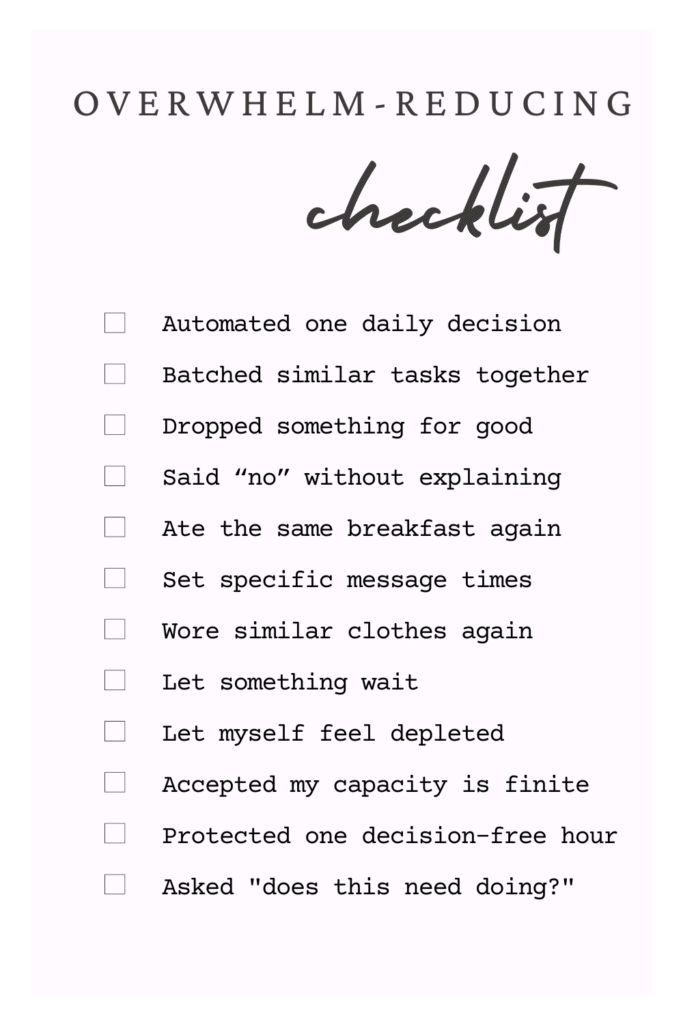Seventeen tabs open in your brain. Everything urgent. Nothing getting done. You don’t need more energy. You need fewer decisions.

The tabs are multiplying. Browser tabs, mental tabs, actual sticky notes covering your desk. You have seventeen different things that all need doing today, twelve decisions waiting for answers, and eight people expecting responses. None of it is optional. All of it is urgent. Your brain is trying to hold everything at once and dropping pieces constantly.
This isn’t burnout. You’re not depleted of energy. You’re drowning in options, obligations, and the paralysis that comes from too many equally important things demanding attention simultaneously. You could do any of them. You can’t decide which. So you do nothing whilst anxiety hums in the background.
What helps when you’re burnt out won’t work here. You don’t need more rest. You need fewer decisions. (Not sure which situation you’re in? Read the main guide.)
Why Everything Feels Urgent When You’re Overwhelmed
When you’re overwhelmed, your brain loses the ability to prioritise. Everything registers as equally important because your threat detection system is firing constantly. Work deadline, friend’s birthday, emails piling up, appointment to reschedule, thing you promised to do, other thing you forgot you promised. All sending the same urgent signal.
Decision fatigue sets in before breakfast. What to eat, what to wear, which task to tackle first, whether to respond now or later, if that email needs a reply at all. Fifty micro-decisions before 9am and you’re already exhausted.
This is where productivity advice betrays you. Time management techniques assume you can clearly see priorities. Prioritisation matrices assume you can objectively assess importance and urgency. You can’t. Everything looks like fire when you’re standing in the middle of burning.
Why Everything Feels Urgent When You’re Overwhelmed
When you’re overwhelmed, your brain loses the ability to prioritise. Everything registers as equally important because your threat detection system is firing constantly. Work deadline, friend’s birthday, emails piling up, appointment to reschedule, thing you promised to do, other thing you forgot you promised. All sending the same urgent signal.
Decision fatigue sets in before breakfast. What to eat, what to wear, which task to tackle first, whether to respond now or later, if that email needs a reply at all. Fifty micro-decisions before 9am and you’re already exhausted.
This is where productivity advice betrays you. Time management techniques assume you can clearly see priorities. Prioritisation matrices assume you can objectively assess importance and urgency. You can’t. Everything looks like fire when you’re standing in the middle of burning.
The Shift: From Managing Everything to Choosing What Gets Dropped
Here’s the truth overwhelm makes impossible to see: you cannot do all of it. Not because you’re failing. Because the volume is genuinely impossible for one human to manage whilst remaining sane.
Something has to give. The question isn’t whether to drop things. It’s which things, and doing it deliberately instead of letting everything slip whilst you panic.
Marcus spent six months trying to manage it all better. Downloaded apps, tried new systems, got up earlier. None of it worked because the volume was the problem, not his management of the volume. When he finally let three commitments lapse completely, no explanation, no guilt, just stopped, the relief was immediate. Not because those things were bad. Because having fewer things meant he could think clearly about the remaining things.
What Cutting the Noise Looks Like
Start with decisions, not tasks. What can you automate so you stop deciding daily? Meal planning isn’t about health. It’s about removing fifty food decisions per week. Wearing similar clothes isn’t about minimalism. It’s about removing morning decision load.
Batch the decisions you can’t remove. Respond to messages once daily instead of constantly. Check email twice instead of leaving the tab open. Have one day for appointments instead of scattering them through the week.
Say no without explaining. “I can’t take that on” is a complete sentence. You don’t owe elaborate justifications for protecting your capacity. The urge to explain is people-pleasing dressed as politeness.
Drop the things you keep thinking about dropping. If you’ve considered cancelling it three times, cancel it. The mental energy spent considering costs more than the actual thing.
The Hard Part Nobody Mentions
Some of what you drop will disappoint people. Some commitments won’t understand. Some opportunities will pass because you didn’t have capacity for them.
This is the cost of not drowning. You can manage overwhelming volume whilst slowly breaking, or you can disappoint people whilst staying functional. There isn’t a third option where you do everything and remain well.
The guilt will suggest you could manage it if you were more organised, more disciplined, more capable. The guilt is lying. Capacity is finite. You’re not failing at unlimited. You’re succeeding at human.
What Daily Life Looks Like
You wake up knowing what needs doing because you decided yesterday, not deciding fresh in the moment. Breakfast is the same thing it always is. You check messages at set times, not constantly. You have one focus for the morning. One for the afternoon. Not seventeen.
When something new arrives demanding attention, it joins the list. It doesn’t interrupt the current thing. The current thing finishes first. Nothing is so urgent it can’t wait two hours, and anything that urgent probably isn’t your responsibility to solve.
This approach fails if you’re burnt out underneath the overwhelm. Simplifying still leaves you depleted because the issue isn’t volume. It’s that you’re running on empty. (Check if burnout is your actual situation.) If you’re starting fresh, you need building blocks before you can streamline. (Read the beginner’s guide.) If you’re stuck in restart cycles, removing decisions won’t fix why nothing maintains. (Explore why nothing sticks.)
When The Noise Quiets
You’ll know it’s working when you can hold a conversation without your brain listing tasks underneath. When you can read a paragraph and remember what it said. When someone asks what you’re doing this weekend and you don’t have to check three calendars.
The space won’t last if you immediately fill it. Don’t add new commitments because you suddenly have capacity. Protect the quiet. Guard the space. Let boring consistency become your new baseline instead of constantly operating at maximum.

Dealing with something else? Check out: Self-Care When You’re Burnt Out | Self-Care When You’re Starting Fresh | Self-Care When You’re Stuck | Back to main guide
You’re not failing at unlimited. You’re succeeding at human.
